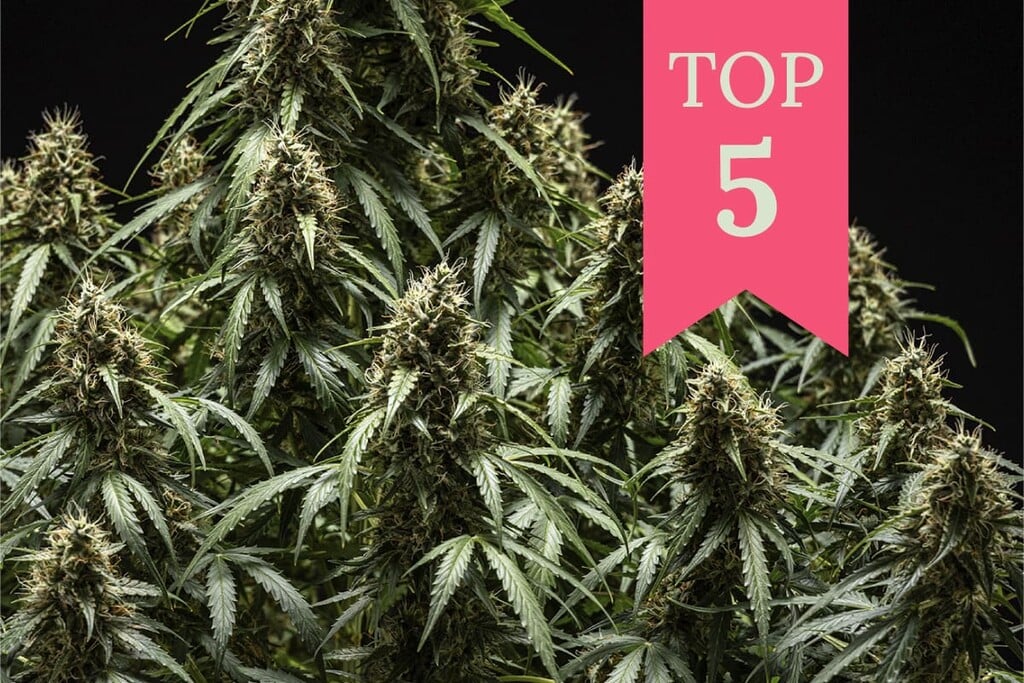.

Could Cannabis Actually Help You Study Better?
It's time for you to be honest with yourself. If you are a university student who loves cannabis, think about how it's impacting your studies. Some research suggests it may be helpful in moderation. Here is our guide to the signs you should be watching out for.
Procrastination often rears its unproductive head when we’re faced with the idea of sitting down and studying. Although the fruits of a successful study session are sweet, getting into a flow state can prove difficult. Daily distractions such as social media and television, as well as the prospect of going to the pub with friends or tending to your grow room, can easily pull us away from reading, writing, and revising.
Thankfully, there are several strategies we can use to lengthen our attention spans, maintain our focus, and come out on top every time we feel tempted to abandon our academic duties. For some people, this means rolling a joint and having a blaze before sitting at their desks. However, cannabis can also have a detrimental effect, depending on the person and how they use it. Below, you’ll discover the pros and cons of using cannabis while studying. Then, we’ll provide some best practices, before introducing you to some of the top strains for a cognitive boost.
The Relationship Between Studying and Recreational Substances
Humans have used mind-altering substances for thousands of years, for a variety of purposes. Even today, these substances are so ingrained in our daily existence that we often forget that they change the way we feel; most people don’t think twice about the psychoactive properties of coffee while ordering a cup on the way to work. People use substances before engaging in all sorts of activities, and studying is no exception.
For example, Adderall, a combination of dextroamphetamine and amphetamine, has become a popular study drug[1] among students in the United States, while so-called “smart drugs”, such as modafinil, have become a hit in British universities[2] for the same purpose. Of course, many students can’t bear the thought of studying without a cup of coffee or three.
But what about weed and studying? Many associate cannabis with red eyes, laziness, and demotivation. However, research has upended this stereotype[3], and shows that many cannabis consumers are both successful and motivated. But the herb affects everybody differently, and this is certainly true in the realm of studying.
Can You Study While High?
Does weed help you study? Does cannabis offer university students a herbal hack while trying to focus on their homework? This question lacks a simple answer. Away from studying, some people have a positive relationship with cannabis. In contrast, others find themselves plunged into a state of panic and paranoia whenever they hit a joint. As such, it’s first important to establish how cannabis makes you feel in general, outside the realm of studying.
If you find that you and cannabis work well together, why not see if it helps out as a study aid? Things will go one of two ways; you’ll either feel supercharged and focused or distracted and unmotivated. But the outcome also has a lot to do with the dose and the type of strain (more below), so matters aren't always straightforward. Check out the advantages and disadvantages of using cannabis while studying to see if it’s the right decision for you.
Advantages of Using Cannabis While Studying
Below are some of the ways in which cannabis might benefit a study session.
- Focus and motivation: The cannabinoid THC underpins the core psychoactive effects of weed. It does so by binding to a receptor in the central nervous system known as CB1. Upon activating this site, brain cells release a surge of the neurotransmitter dopamine. This chemical plays a key role in motivational control. If you get on well with cannabis and find your "sweet spot" dose, you might find that weed gives you the drive to study.
- Creativity: Many subjects require linear thinking—the systematic and analytical type of thought useful in the fields of science and maths. However, you’ll often find yourself having to come up with unique solutions to challenging problems while studying at higher levels. This is where divergent thinking—the thought processes used to generate creative ideas—comes in. Research[4] shows that cannabis can improve certain aspects of divergent thinking at lower doses, while impairing it at higher doses.
- Structure: Studying with cannabis could help you develop a structure for your days of reading and revising. Instead of popping out for a coffee every couple of hours, you can instead take 10-minute intervals to clear your mind and top up your endocannabinoid system before diving back into your work.
- Flexibility: The effects of cannabis are varied. Every strain possesses a different profile of phytochemicals, namely cannabinoids and terpenes. Experiment with different options to see what works best for you. Some cultivars offer a more stimulating and energising effect, others are more stoning and relaxing, and others don't cause any high at all.
| Focus and motivation | The cannabinoid THC underpins the core psychoactive effects of weed. It does so by binding to a receptor in the central nervous system known as CB1. Upon activating this site, brain cells release a surge of the neurotransmitter dopamine. This chemical plays a key role in motivational control. If you get on well with cannabis and find your "sweet spot" dose, you might find that weed gives you the drive to study. |
| Creativity | Many subjects require linear thinking—the systematic and analytical type of thought useful in the fields of science and maths. However, you’ll often find yourself having to come up with unique solutions to challenging problems while studying at higher levels. This is where divergent thinking—the thought processes used to generate creative ideas—comes in. Research[4] shows that cannabis can improve certain aspects of divergent thinking at lower doses, while impairing it at higher doses. |
| Structure | Studying with cannabis could help you develop a structure for your days of reading and revising. Instead of popping out for a coffee every couple of hours, you can instead take 10-minute intervals to clear your mind and top up your endocannabinoid system before diving back into your work. |
| Flexibility | he effects of cannabis are varied. Every strain possesses a different profile of phytochemicals, namely cannabinoids and terpenes. Experiment with different options to see what works best for you. Some cultivars offer a more stimulating and energising effect, others are more stoning and relaxing, and others don't cause any high at all. |
| Focus and motivation |
| The cannabinoid THC underpins the core psychoactive effects of weed. It does so by binding to a receptor in the central nervous system known as CB1. Upon activating this site, brain cells release a surge of the neurotransmitter dopamine. This chemical plays a key role in motivational control. If you get on well with cannabis and find your "sweet spot" dose, you might find that weed gives you the drive to study. |
| Creativity |
| Many subjects require linear thinking—the systematic and analytical type of thought useful in the fields of science and maths. However, you’ll often find yourself having to come up with unique solutions to challenging problems while studying at higher levels. This is where divergent thinking—the thought processes used to generate creative ideas—comes in. Research[4] shows that cannabis can improve certain aspects of divergent thinking at lower doses, while impairing it at higher doses. |
| Structure |
| Studying with cannabis could help you develop a structure for your days of reading and revising. Instead of popping out for a coffee every couple of hours, you can instead take 10-minute intervals to clear your mind and top up your endocannabinoid system before diving back into your work. |
| Flexibility |
| he effects of cannabis are varied. Every strain possesses a different profile of phytochemicals, namely cannabinoids and terpenes. Experiment with different options to see what works best for you. Some cultivars offer a more stimulating and energising effect, others are more stoning and relaxing, and others don't cause any high at all. |
Disadvantages of Using Cannabis While Studying
Cannabis might revolutionise the way you study. However, by firing up a joint before opening your books, you also run the risk of derailing your studying session. Here's where things can go wrong.
- Loss of motivation: Cannabis doesn’t send every user into a place of motivation and focus. In fact, it can produce the opposite effect, especially at higher doses. Even after smoking purportedly energising strains, some smokers feel their eyelids get heavy and their zest to study wane.
- Negative side effects: THC-rich cannabis has a list of its own negative side effects that can put even the strictest student off studying until the feelings pass. These include an elevated heart rate, paranoia, panic, anxiety, impaired memory, and an altered sense of time.
- Distracting: Even if you don’t feel any negative side effects after a smoke, you could end up distracted. While some strains boost focus, you might end up focusing on the entirely wrong thing, such as trippy music videos or your social media feed in search of posts to enhance your high.
| Loss of motivation | Cannabis doesn’t send every user into a place of motivation and focus. In fact, it can produce the opposite effect, especially at higher doses. Even after smoking purportedly energising strains, some smokers feel their eyelids get heavy and their zest to study wane. |
| Negative side effects | THC-rich cannabis has a list of its own negative side effects that can put even the strictest student off studying until the feelings pass. These include an elevated heart rate, paranoia, panic, anxiety, impaired memory, and an altered sense of time. |
| Distracting | Even if you don’t feel any negative side effects after a smoke, you could end up distracted. While some strains boost focus, you might end up focusing on the entirely wrong thing, such as trippy music videos or your social media feed in search of posts to enhance your high. |
| Loss of motivation |
| Cannabis doesn’t send every user into a place of motivation and focus. In fact, it can produce the opposite effect, especially at higher doses. Even after smoking purportedly energising strains, some smokers feel their eyelids get heavy and their zest to study wane. |
| Negative side effects |
| THC-rich cannabis has a list of its own negative side effects that can put even the strictest student off studying until the feelings pass. These include an elevated heart rate, paranoia, panic, anxiety, impaired memory, and an altered sense of time. |
| Distracting |
| Even if you don’t feel any negative side effects after a smoke, you could end up distracted. While some strains boost focus, you might end up focusing on the entirely wrong thing, such as trippy music videos or your social media feed in search of posts to enhance your high. |
Tips for Studying While High
If you’ve found that you like studying while high, we have a few extra tips to help you optimise the experience. These recommendations will help you to avoid getting too stoned, and will minimise short-term memory issues.
Try Microdosing
Microdosing refers to taking small amounts of cannabis. A single puff from a joint won’t send you to the moon. In fact, you’ll barely feel anything at all. However, even small amounts of THC can help you maintain focus and get excited to study, without compromising your mental faculties or causing you to get distracted.
Choose a Strain Loaded With α-Pinene
You can’t study effectively if you keep forgetting what you just read. Strains high in the terpene α-pinene can potentially help to stave off the short-term memory inhibition associated with THC. Early research[5] shows that this terpene may inhibit an enzyme called acetylcholinesterase. This protein breaks down acetylcholine, a chemical that plays a key role in memory function.
img
Stay Hydrated and Well-Fed
Even if you get on well with cannabis most of the time, becoming dehydrated can increase the odds of a negative experience. Plus, even slight dehydration can reduce brain performance and memory. Eating a proper meal before blazing and studying will also help to curb the munchies, perhaps the biggest reason you’ll consider leaving your desk when high.
Select the Optimal Route of Administration
How you take cannabis will also have a large impact on your study session. Edibles really have no place in this scenario; they’ll get you far too stoned. Instead, stick with smoking, vaping, or sublingual administration for a rapid onset of effects and more control over dosing.
Consider Low-THC and High-CBD Strains
While THC can help to motivate and inspire, too much can quickly put a damper on your study session. With that in mind, consider opting for strains with lower levels of THC, or, better yet, higher levels of CBD, to offset some of the more undesirable side effects, such as paranoia.
img
Best Cannabis Strains to Help You Study and Focus
The best strain for studying while high depends on the individual. Some like to take a few puffs of a high-THC strain, while others may choose a cultivar with a more diverse cannabinoid profile. Below are some examples of strains that all bring something different to your study session.
- Mental clarity: Haze Berry packs high levels of THC alongside large quantities of α-pinene that help to blunt the peak of the high and keep the memory razor sharp. But if you really want to keep focus high while still enjoying a smoke, consider a strain like Stress Killer, which contains moderate levels of both THC and CBD.
- Stimulation: Royal Runtz harnesses a THC content of 27% to exert a powerful, euphoric, and uplifting high. While not ideal for beginners, a couple hits of this strain will keep more experienced smokers energised and locked into the task at hand for hours at a time.
- Relaxation: Wedding Crasher produces a soothing high that will make time slow down. If you’re feeling overwhelmed before a test or on edge for whatever reason, this cultivar will help you to settle into the moment and tick off your goals one by one.
Which Is Better for Studying: Sativa or Indica?
Despite the myth perpetuated by pop culture, the terms “sativa” and “indica” do not denote the effects of a particular cultivar. Typically, sativa varieties are said to offer energising effects, whereas indica strains provide stoning body highs. However, these labels only refer to the morphology (the physical features) of a cannabis variety; sativas are generally taller with thin leaflets, while indicas are smaller and bushier with wider leaflets.
Ultimately, cannabinoids such as THC and CBD dictate the core effects of each cultivar, while terpenes are what differentiate a stoning high from an energising one. If you’re seeking stimulation, select varieties higher in limonene and pinene. If you want relaxation, opt for those with plenty of myrcene.
Studying While High: Is It a Good Idea?
Studying while high works well for a lot of cannabis users. You’ll only know if it works well for you by giving it a try. If things go south, stick with coffee instead. If you find that weed and studying go hand in hand, try to refine the process for the best outcome. Continue to experiment with dose and route of administration to find your sweet spot and determine which strains offer the best phytochemicals to get you in the mood to dig into your work.
- https://www.spectator.co.uk/article/american-universities-are-fuelled-by-amphetamines-so-i-tried-them
- https://www.theguardian.com/society/2015/feb/15/students-smart-drugs-higher-grades-adderall-modafinil
- https://www.forbes.com/sites/javierhasse/2021/08/11/study-shows-cannabis-consumers-are-successful-motivated-health-conscious-snoop-dogg-weighs-in/?sh=619f378e1233
- https://link.springer.com/article/10.1007/s00213-014-3749-1
- https://pubmed.ncbi.nlm.nih.gov/28826544/





































